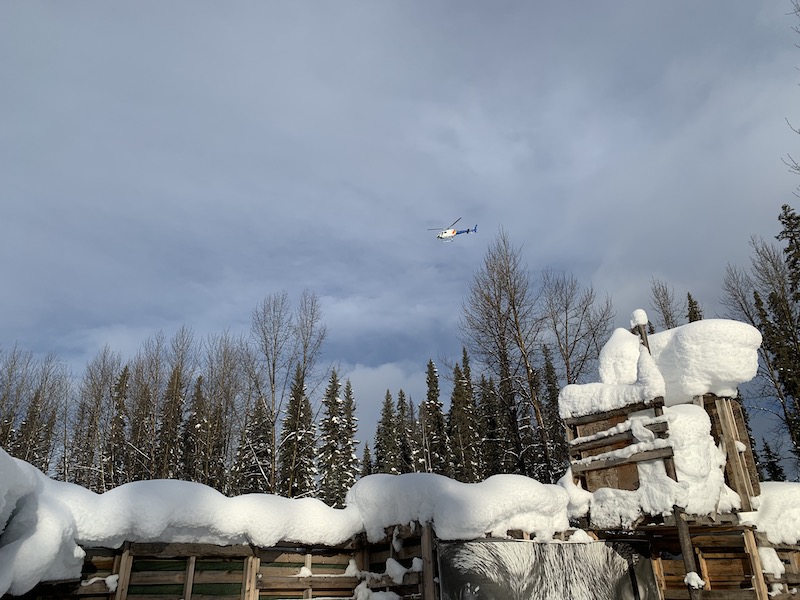It’s Tuesday night in the Wet’suwet’en land defender camp at kilometre 39 on the Morice West Forest Service Road.
Some supporters are gathered around a fire, laughing as they reminisce about a month spent camping as temperatures plunged as low as -44.
There’s also nervousness about what lies ahead.
That afternoon, talks between Wet’suwet’en hereditary chiefs and the provincial government aimed at breaking an impasse over the Coastal GasLink pipeline broke down, raising the prospect that the RCMP would move quickly to enforce a Dec. 31 injunction and try to remove the camp.
At 5 p.m., a grader had begun clearing the road to the camp, one of four set up by the Wet’suwet’en and allies along the forest road about 60 kilometres south of Smithers, which campers took as a sign of imminent police action.
Molly Wickham, governance director for the office of the hereditary chiefs, breaks the news to supporters gathered around the fire.
“We knew that the province wasn’t coming to the table. They weren’t ever trying to resolve the issue, they were just trying to get us to give up and let them come in,” she says. “Tomorrow might be the day.”
Sitting by the fire, Molly’s partner, Cody Merriman, gives a powerful speech.
“This is for something greater than ourselves,” he says. “This is a part of a legacy. This is part of something that will get passed down beyond us… We’re in something that’s going to impact our children and who come after them. We’re talking about many generations.”
“And you guys helped contribute to that in a very meaningful and impactful and lasting way,” Merriman says. “And it’s not over.”
“I know everyone’s tired, we all are, but we’ve just got to dig a little bit deeper,” he said. “Whatever comes, comes. And it’s coming. But we’re going to be ready.”
Molly Wickham anoints each of them with medicine for protection.
I set out in the dark for the next camp at kilometre 44, where the RCMP action took place on Jan. 7, 2019, as armed police enforced a previous injunction and arrested 14 people.
There are a handful of supporters here. I find a space to sleep and wake at 4 a.m. to the sounds of snowmobiles and chainsaws, as camp residents build a lookout post on the bridge where last year’s police action took place.
Police action imminent
But police action didn’t come during the day Wednesday.
At an afternoon press conference, RCMP Assistant Commissioner Eric Stubbs, in charge of criminal operations for the RCMP in B.C., confirmed police were preparing to act. “Police do not have the option of refusing to enforce injunctions,” he said.
Stubbs said protesters should leave the area or face arrest.
“If there are arrests to be made, there are peaceful options that will require minimal use of force,” Stubbs said. Protesters who agreed to voluntary arrest would be allowed to walk from the area without handcuffs, he said. Those who chose passive resistance would be carried to RCMP vehicles.
If people resist, “our members will respond to the behaviours that are presented to them,” Stubbs said. Officers are instructed to use the least amount of force necessary, he added.
Freda Huson, spokesperson for the Unist’ot’en house group and healing centre at kilometre 66, said the group began occupying the land here more than a decade ago.
“We’re not breaking the injunction. Canada’s laws don’t apply here,” she said after watching the RCMP news conference. “Canada has provided no documentation where chiefs signed over their authority to government or band councils.
“[Coastal GasLink] got their injunction based on lies. This whole system is set up for industry and government.”
Asked whether she’ll allow RCMP into the area, Huson said, “Depends how they show up.”
Talks broke down yesterday
The Wet’suwet’en campers and their supporters are trying to stop a $6.2-billion pipeline that would carry gas from the province’s northeast to an LNG plant in Kitimat.
Wet’suwet’en hereditary chiefs oppose the pipeline. According to the province, 20 First Nations’ elected councils have signed benefit agreements with TC Energy Corps., the company building the pipeline.
Tensions have been rising in the region since Dec. 31, when the B.C. Supreme Court granted Coastal GasLink a permanent injunction allowing the company access to the pipeline route. Wet’suwet’en hereditary chiefs responded by evicting CGL from the area on Jan. 4 and closing the Morice forestry road, which leads to the pipeline construction site.
On Jan. 13, the RCMP created a checkpoint on the Morice road and limited access to the area.
The same day, B.C. Premier John Horgan told media the provincial government would not respond to the Wet’suwet’en requests for a meeting.
“This project is proceeding, and the rule of law needs to prevail in B.C.,” he said.
But on Thursday, the hereditary chiefs and the provincial government agreed to seven days of talks to attempt to find a solution.
The talks, which took place Monday and Tuesday in Smithers, broke down after two days.
The hereditary chiefs blamed the company in a statement from the Office of the Wet’suwet’en.
“Coastal GasLink declined to see this discussion resulting in progress,” it said. “Therefore, the enforcement of the injunction zone is imminent.”
B.C. Minister of Indigenous Relations and Reconciliation Scott Fraser confirmed talks had ended.
“While we were not successful in finding a resolution to the current situation, we continue to remain open to dialogue with the Wet’suwet’en leadership on this issue,” he said in a statement. “We hope that the paramount need for safety stays the top priority for all parties.”
Supporters fear a repeat of the 2019 raid and arrests.
The Guardian, a British newspaper, reported in December that RCMP planning notes included a call for “lethal oversight” — snipers — and that police commanders instructed officers to “use as much violence toward the gate as you want.” ![]()
Read more: Indigenous, Energy

















Tyee Commenting Guidelines
Comments that violate guidelines risk being deleted, and violations may result in a temporary or permanent user ban. Maintain the spirit of good conversation to stay in the discussion.
*Please note The Tyee is not a forum for spreading misinformation about COVID-19, denying its existence or minimizing its risk to public health.
Do:
Do not: